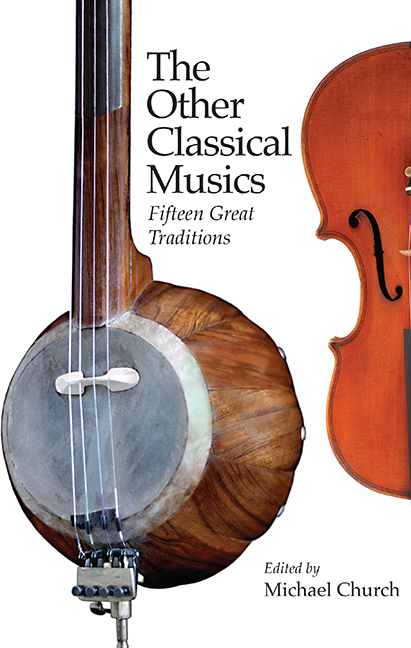Book contents
- Frontmatter
- Dedication
- Contents
- List of Illustrations
- List of Contributors
- Preface and Acknowledgements
- Introduction
- Maps
- 1 Thailand, Laos, Cambodia, Vietnam
- 2 Java
- 3 Japan
- 4 China: The Guqin Zither
- 5 Chinese Opera
- 6 North India
- 7 South India
- 8 Mande Jaliyaa
- 9 North American Jazz
- 10 Europe
- 11 North Africa and the Eastern Mediterranean: Andalusian Music
- 12 The Eastern Arab World
- 13 Turkey
- 14 Iran
- 15 Uzbekistan and Tajikistan
- Notes
- Bibliographies
- Index
15 - Uzbekistan and Tajikistan
Published online by Cambridge University Press: 29 May 2021
- Frontmatter
- Dedication
- Contents
- List of Illustrations
- List of Contributors
- Preface and Acknowledgements
- Introduction
- Maps
- 1 Thailand, Laos, Cambodia, Vietnam
- 2 Java
- 3 Japan
- 4 China: The Guqin Zither
- 5 Chinese Opera
- 6 North India
- 7 South India
- 8 Mande Jaliyaa
- 9 North American Jazz
- 10 Europe
- 11 North Africa and the Eastern Mediterranean: Andalusian Music
- 12 The Eastern Arab World
- 13 Turkey
- 14 Iran
- 15 Uzbekistan and Tajikistan
- Notes
- Bibliographies
- Index
Summary
It's late afternoon, and the palace courtyard is filling with people. Musicians arrive, take out their lutes and tune until they resonate in unison. The first beat of the frame-drum signals the entrance of the other instruments, and the pulse stills conversation. The patron and his guest take their places, and the court singer begins a song in praise of a love which is at once human and divine; the instrumentalists join in singing the next song. Then the performance starts to traverse a variegated landscape of melodies and rhythms, shifting between vocal and instrumental passages, competitive sections and solos. The patron's impassive gaze goads the ensemble to ever greater virtuosity till they rise in unison to a sustained peak, after which they slip seamlessly into their final piece, gradually descending back to their starting note.
‘CENTRAL ASIA’ today comprises not only the republics of Uzbekistan, Tajikistan, Turkmenistan, Kazakhstan and Kyrgyzstan, but also the northern parts of Iran, Afghanistan, Pakistan, Kashmir and western China extending to the southern reaches of Siberia and Mongolia. Because most of this region was absorbed into the Soviet Union at the start of the twentieth century, the West has only recently been afforded proper access to its cultures, but Central Asia has intrigued outsiders for centuries. Its situation at the centre of the world's largest continental land-mass gave rise to the trade routes which collectively came to be known as the Silk Road, and it was along this colossal network linking the Far East with Europe that merchants, emissaries and adventurers travelled to and from the furthest corners of the earth. Accounts by Marco Polo, Xuan Zang, Ibn Battuta and others provided the rest of the world with insights into its economic and political realities, but culture was seldom their primary concern. And while ornate silk brocades, precious gems and rare spices are what the Silk Road conjures up in the popular imagination, Central Asia's musical heritage contains treasures every bit as precious.
Of all the musical traditions in Central Asia which might be considered ‘classical’, this chapter will focus on those of the ancient urban centres of Uzbekistan and Tajikistan. The classical music played today in those countries developed primarily in the ancient cities of Bukhara, Samarqand, Khiva and Qoqand, all of which served as the political and cultural centres of the dynasties that dominated Central Asia for five centuries.
- Type
- Chapter
- Information
- The Other Classical MusicsFifteen Great Traditions, pp. 340 - 360Publisher: Boydell & BrewerPrint publication year: 2015



